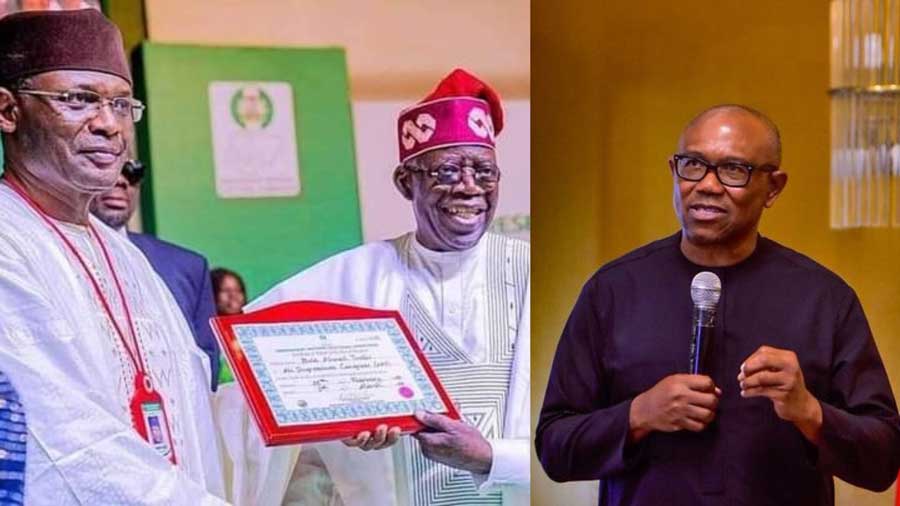TRIBUNAL: INEC, Tinubu Get 21-Days To Reply Obi, Atiku’s Petitions Challenging Presidential Election Results
….As LP Candidate Claims INEC Suppressed His Votes In 18,088 Polling Units In Rivers, Benue, Others
The Independent National Electoral Commission (INEC) and winner of Nigeria’s 2023 presidential election, Bola Ahmed Tinubu, have 21 days to respond to different petitions filed against the outcome of the poll.
Advertisement
Also required to respond are Tinubu’s running mate, Kashim Shettima, and the ruling All Progressives Congress (APC).
Based on provisions of the Electoral Act 2022, they are to either admit or deny all the issues raised in the petitions filed by the presidential candidate of the Labour Party, Peter Obi, and that of the Peoples Democratic Party, Atiku Abubakar, among others.
Obi had on March 20 filed his petition against the outcome of the 2023 presidential election at the Presidential Election Petition Registry’s office while Atiku, a former vice president, filed his petition on Tuesday.
Among other things, Obi claims that his scores in the election were suppressed in 18,088 polling units and that this was allegedly aided by the INEC when it deliberately uploaded unreadable and blurred forms EC8As on the INEC Results Viewing Portal, IReV.
Advertisement
Using Rivers State as example, Obi said while INEC announced Tinubu as winner in the state with 231,591 votes, “however, by the actual scores obtained at the polling units, the petitioner’s lawful votes in Rivers State are 205,110 votes while Tinubu’s score ought to be 84,108 votes.”
The lawyers stated they would at the trial rely on the forensic report on electoral materials and the BVAS to show that Obi’s majority votes were “unlawfully reduced” and “added by INEC” to the scores of Tinubu, in states like Rivers, Lagos, Taraba, Benue, Adamawa, Imo, Bauchi, Borno, Kaduna, and Plateau.
In Ekiti, Oyo, Ondo, Taraba, Osun, Kano, Katsina, Kwara, Gombe, Yobe and Niger states, Obi claimed that the BVAS showed massive overvoting in favour of Tinubu.
For Atiku Abubakar, he urged the Tribunal to determine that he ” having scored the majority of lawful votes cast at the Presidential election of Saturday, 25th February 2023, be returned as the winner of the said election and be sworn in as the duly elected President of the Federal Republic of Nigeria”, adding that there was non-compliance to the Electoral Act in Tinubu’s victory.
Having received the petitions, the Electoral Act mandates the Secretary of the petitions court to immediately serve them on the respondents.
Advertisement
“(1) On the presentation of an election petition and payment of the requisite fees, the Secretary shall immediately (a) cause notice of the presentation of the election petition, to be served on each of the respondents ; (b) post on the tribunal notice board a certified copy of the election petition ; and (c) set aside a certified copy for onward transmission to the person or persons required by law to adjudicate and determine the election petition,” The first schedule of the Electoral Acts reads.
After the petitions have been served, the respondents are given 21 days to reply to the petitions.
The Electoral Act partly reads,” “(1) The respondent shall, within 21 days of service of the petition on him file in the registry his reply, specifying in it which of the facts alleged in the election petition he admits and which he denies, and setting out the facts on which he relies in opposition to the election petition.
“(2) Where the respondent in an election petition, complaining of an undue return and claiming the seat or office for a petitioner intend to prove that the claim is incorrect or false, the respondent in his reply shall set out the facts and figures clearly and distinctly disproving the claim of the petitioner.
“A respondent who has an objection to the hearing of the petition shall file his reply and state the objection in it, and the objection shall be heard along with the substantive petition.”



